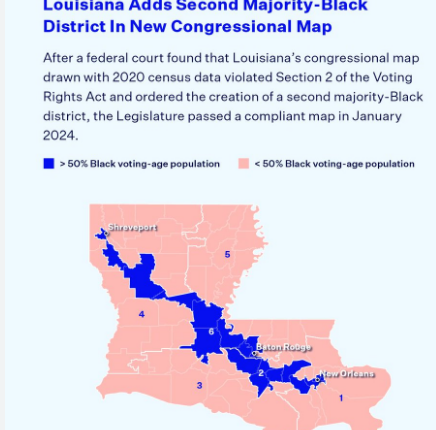Louisiana’s congressional map is set to undergo significant changes with the addition of a second black majority district, a move that marks a pivotal moment in the state’s political landscape. The new district configuration comes as part of a broader series of discussions and decisions made during a special legislative session that also touched upon the implementation of closed party primaries for federal elections.
Second Black Majority District
The alterations to the congressional map notably impact House Speaker Mike Johnson’s District Four, which predominantly covers Northwest Louisiana, and Congresswoman Julia Ludlow’s District Five, encompassing Northeast Louisiana and parts of the North Shore. This redistricting is seen as a crucial step towards ensuring greater representation and fairness in the state’s political process, particularly for its black population.
The decision to add another black majority district has been long-awaited and is a response to calls for more equitable representation in Louisiana. With this change, the state aims to address historical imbalances and provide a platform where the voices of its black communities can be more effectively heard and represented in Congress.
The special session not only focused on redistricting but also brought to the forefront the topic of closed party primaries. Lawmakers engaged in extensive discussions on this matter, ultimately agreeing to implement closed party primaries solely for the state’s federal elections, the State Supreme Court Bessie Board, and the Public Service Commission. This decision marks a shift in Louisiana’s electoral process, potentially influencing the dynamics of future elections and party politics within the state.
Both measures – the redistricting and the introduction of closed party primaries – are now awaiting the governor’s signature. Given the nature of the discussions and the support these measures have garnered, the governor’s approval is widely anticipated. The adoption of these measures is expected to bring about a significant transformation in the state’s political and electoral landscape.
In addition to these key topics, the lawmakers are scheduled to reconvene in February for another special session, this time focusing on crime fighting solutions. This upcoming session underscores the state government’s commitment to addressing critical issues affecting Louisiana’s communities. Following this, the legislators will get a brief respite before returning for the regular spring session, slated to begin in March.
As Louisiana approaches these legislative sessions, the state stands at a crossroads of potential significant change. The introduction of a second black majority district in the congressional map is more than a mere alteration of lines; it represents a move towards greater inclusion and diversity in the state’s political representation. Similarly, the shift to closed party primaries for federal elections could redefine the political playing field, affecting how candidates are nominated and how elections are contested.
Read More:
- Navigating the Safety Landscape: A Comprehensive Look at Virginia’s McLean Neighborhoods
- Northwest Indiana blasted with more than two feet of lake-effect snow
- Navigating the Legality and Safety of Barefoot Driving in Ohio
The upcoming sessions will provide further insights into how these changes will be implemented and their long-term impact on the state’s political dynamics. As Louisiana embarks on this path of transformation, the focus will be on how these changes will resonate with the citizens and how they will shape the future of politics in the state.

